I have a “Collie” alert set on Craigslist, so I’ll get an email notification when one is posted in my area. (Not to get a 4th dog, but so I can tell my local Collie rescue if I see one in need of a home.) You know what I found? At least 95% of the time I get a “Collie” alert, it’s not for a Rough Collie, or even a Smooth Collie. It’s for a Border Collie.
Some of these ads are Border Collie puppies for sale (even though that’s not allowed, per Craigslist rules), but most of them are “rehoming my dog” ads. The majority of these dogs are just a year old or younger, and the reasons for rehoming them are invariably similar. Their owners will say things like: “This dog is too energetic,” or “I don’t have the time for this dog,” or “This dog needs a lot of attention.”
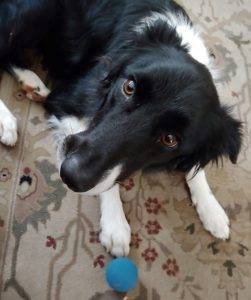
The great heartbreak of it all is, if these people had just taken the time to learn about the breed beforehand, they would have known that Borders have a lot of energy and require a great deal of time and attention. As sheepdogs, they were bred to work, to go all day if need be, and they excel at it.
A friend at an Internet Marketing company I’ve written for told me the phrase “Border Collie puppies” is searched an average of 30,000 times each month! Too many dogs in general, regardless of breed, are surrendered by their owners simply because too little was known before people decided to scroll through sale ads get a puppy.
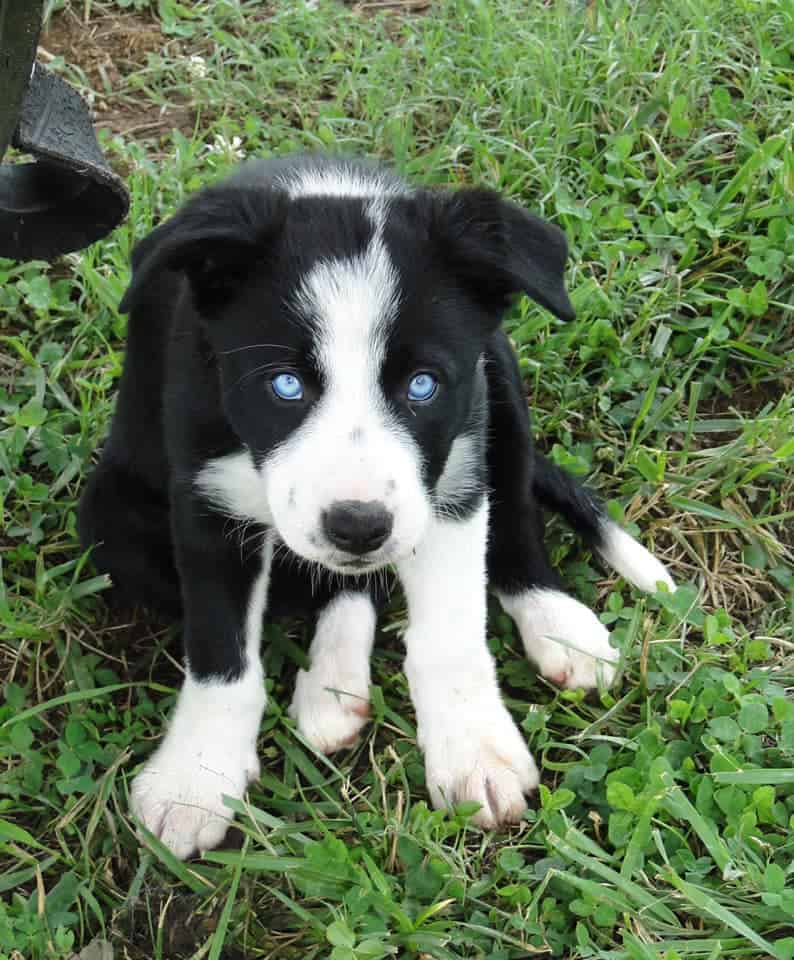
Many beautiful, whip-smart Border Collies are being given up through no fault of their own, but apparently they just weren’t what people were expecting. It was simply their misfortune to be sold by a breeder who wasn’t careful to place them in well-suited situations, to someone who knew only that Borders are cute and smart.
But you’re here, reading this. So that means you’re attempting to do your research. Good news! I’ve done my research, too. Before sitting down to write this post, I gathered information from a myriad of Border Collie owners, breeders, and rescue volunteers. I asked the questions I’d ask if I were considering getting a Border Collie, so I could pass their answers on to you.
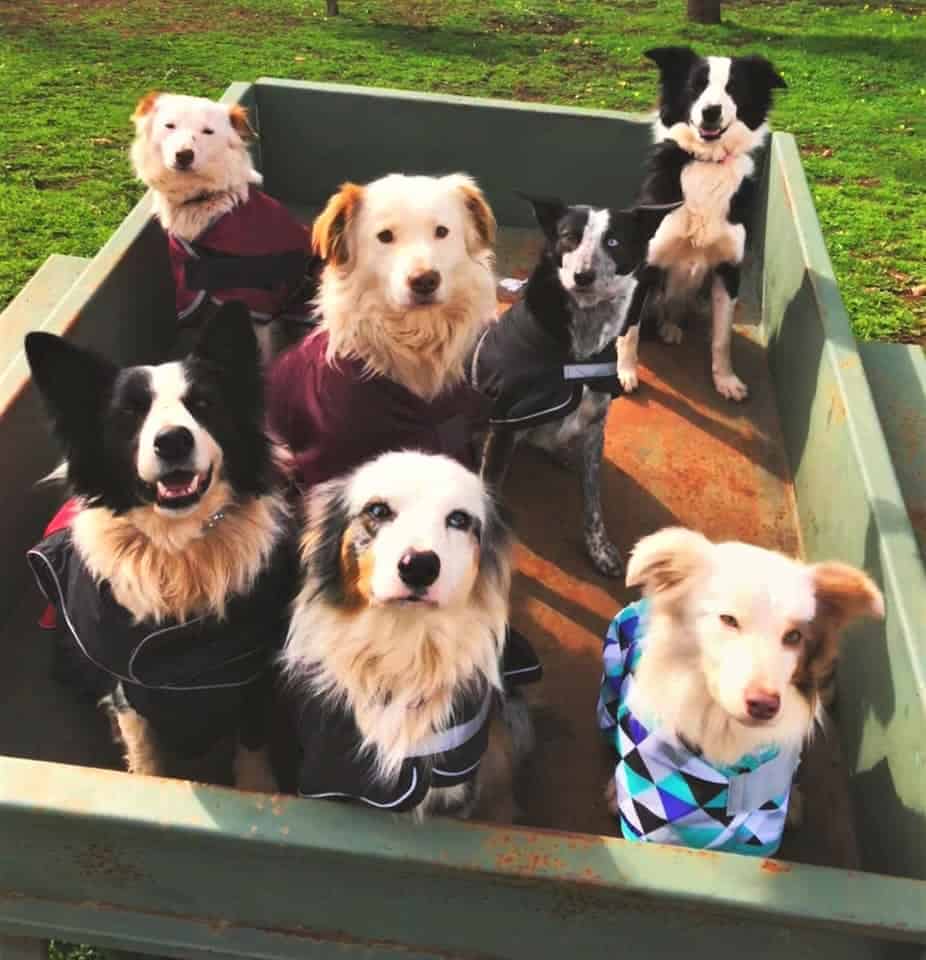
What Owners Say
As a child, Donna Gagne grew up with a Border Collie, and she has had four more in her lifetime since. Here’s her take on the breed:
“There are a lot that get dumped because people don’t realize how high maintenance they are. They are not city dogs; they need to get out and go. With so much energy, they tend to get into trouble because they are bored. Sometimes they nip at people, but that is part of their herding instincts. They are so misunderstood, and they are the smartest dog there is.
They are workers, no doubt. Even if it’s a ball to catch, you have to plan on LOTS of outside time to play with them, because they are all about their humans. They don’t spend a lot of time playing by themselves or other dogs – it’s YOU they want to play/work with. These are all reasons so many end up in shelters.”
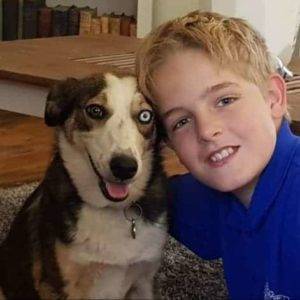
Donna’s female Border used to nip at the grandchildren when they were young. Figuring she was trying to herd them, Donna taught her how to herd ducks instead. “After she had her ducks and knew the commands, she never nipped at the kids again,” Donna said.
Another of Donna’s Borders was a gentleman named Pepe Le Pew who lived to the advanced age of fifteen. As a toddler, Donna’s grandson was constantly trying to climb up the stairs, making the adults chase after him to stop him. Before long, Pepe started blocking the stair access for them!
According to Donna, Border Collies “really are amazing dogs.” She currently has a rough coat Border Collie rescue named Radar who has come a long way since she got him.
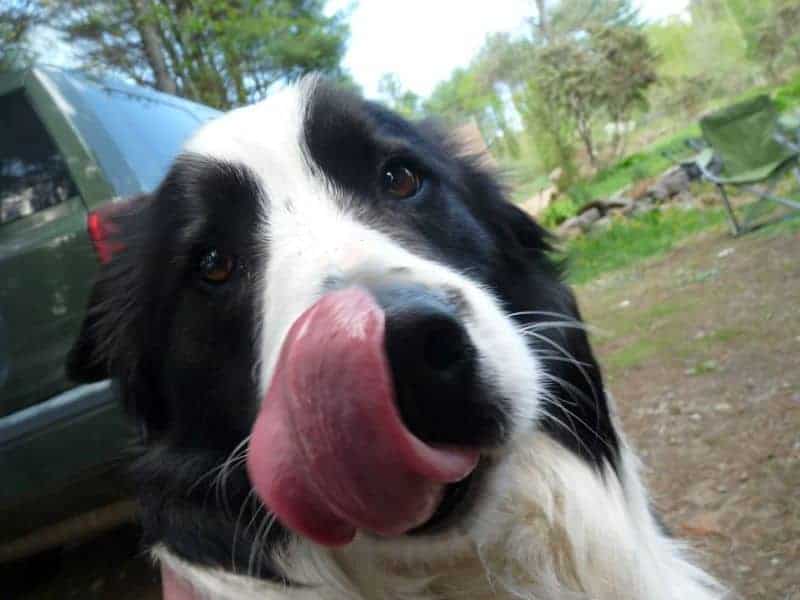
Nikki Whittingham has three Border Collies, two of whom are rescues. Shadow, the family patriarch, is now 9 years old and retired from agility. Nikki describes him as innocent, independent, and the cleverest dog she has ever had.
Chase was rehomed at the age of 9 months by a family who had no time for and didn’t want him anymore. Now 3 years old, he is the most loving dog Nikki has ever owned, and he is very speedy at running through agility tunnels.
Her most recent rescue acquisition, Freddie, is only 6 months old. Nikki is still getting to know him, but says he is a typical puppy, though he has some fear and nerves to work through. Getting him past his apprehensions will take some effort, but his cute personality makes him well worth it.

Another Border Collie owner I talked to is on her sixth BC now, and she warns potential owners that these dogs have “the intelligence level of a five-year-old human.” One of her Borders figured out how to open the fridge and get into the cabinets!
While at a local dog park, I met a gorgeous Border Collie named Finn who eagerly chased after a frisbee while his tired-looking owner sat on a bench and threw it repeatedly. Our dogs (2 Rough Collies and an Australian Shepherd mix) tried to engage Finn in play, but he would not be distracted from his chosen sport.
I struck up a conversation with Finn’s owner, asking him what it was like to have a BC while living in the city. “Well…” he responded. “We’re here, doing this, twice a day – morning and evening, for at least an hour each time. If we don’t, he’ll tear up the apartment.”
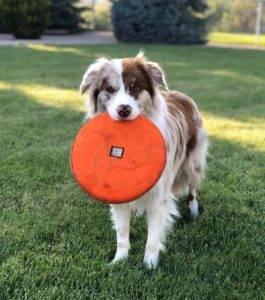
Michelle Dean lives in Pennsylvania, USA with 3 purebred Border Collies who train and compete in Conformation, Rally, Tricks, and Agility. She had this to say about her experience with Border Collies:
“They are very intelligent and eager to please, and with that can be as intense as they are loving. A happy Border Collie is one that has purpose and something to do with his or her smarts and energy, which can be jobs as varied as herding, agility, nosework, or learning new tricks. While they can be chill, they do not make for good couch potato dogs.
This is Poppy, (aka Roughstocks Lovey Lolly Molly Pop, CGC, RN), a red and white Border Collie who is about 19 months old in this picture. These ribbons were all from one weekend: she earned two majors in breed and her title in Rally! She is special girl.”
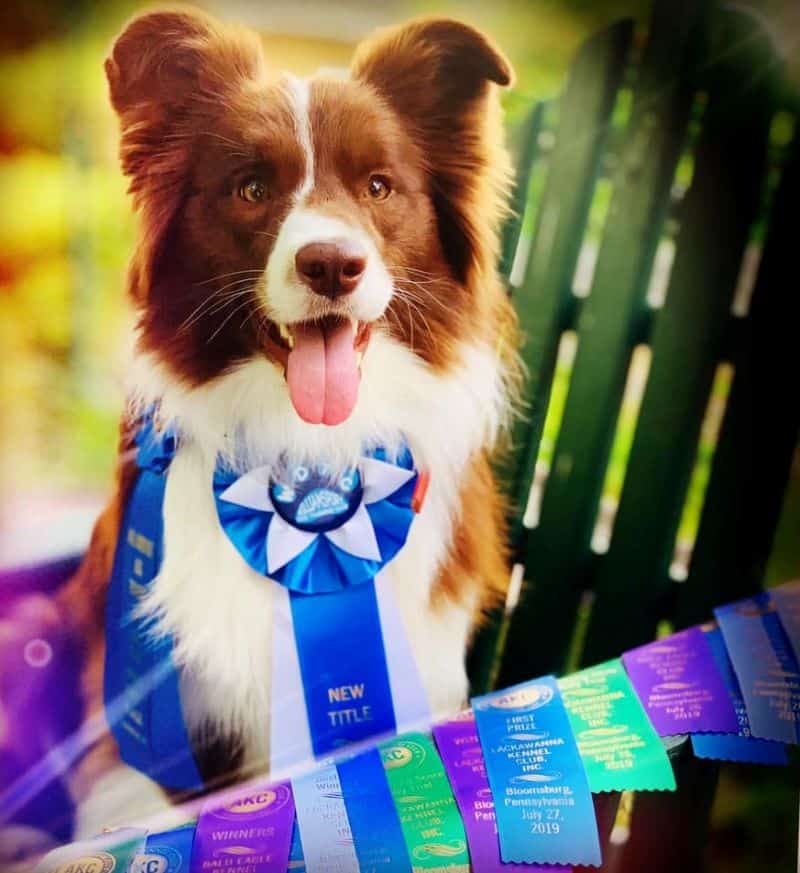
Marika Lg lives in Quebec, Canada and likes to get out and photograph Border Collies on the go. She said:
“Having a Border Collie by your side makes you push your limits, always. Seeing them tired and sleeping at the end of the day is an accomplishment: a hard one, but oh, so satisfying! I really think they bring out the best of me. If you are willing to give them everything you have – free time, patience, and love – they will make your life fullfilled and your heart glow. Be ready for some action!”
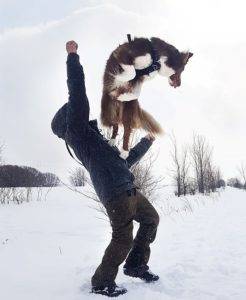
What Breeders Say
Dennis and Merry Lou Gumm of Nightshades Border Collies gave some excellent information (and cautions) for those considering bringing a Border Collie home:
Character: The Border Collie forms a close bond with its family and is extremely intelligent, determined, and brave. They are eager to work and play and are energetic and likable. Border Collies are extremely loyal and like to please their owners. They are sensitive, loving dogs.
Temperament: The Border Collie gets along quite well with other pets and children – provided it has plenty of activity to keep it occupied. It may get along more easily with dogs of the opposite sex. Border Collies should be socialized with small, non-canine pets when young to overcome the prey instinct.
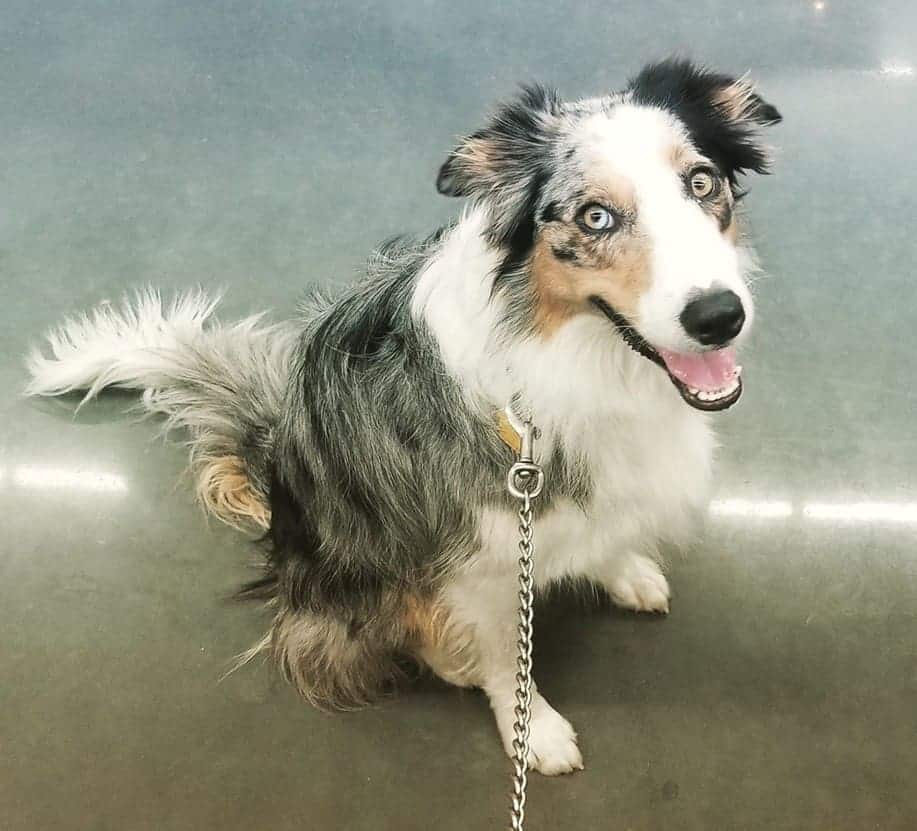
Care: Border Collies can become destructive if ignored or insufficiently exercised, especially if left alone for long periods. They are like an active, inquisitive child: if you don’t provide something for them to do, they will create their own entertainment; and it may not be something you want them to do.
Training: The Border Collie’s tremendous intelligence and desire to please make training simple. They are very obedient and agile, and due to their high intelligence and desire to please can be taught almost anything. Border Collies are eager to learn and play sports and games.
Activity: Border Collies like to be busy. They are well-suited and make great pets for people with active lifestyles. They especially love sports such as Frisbee or playing ball, jogging, hiking, and other types of activity; but are just as happy playing and doing things with their owners. Having originated as a sheepdog and cattle-herder, the Border Collie has a natural instinct to herd, is highly work-focused, and most happy when given specific tasks on a regular basis. They are especially suited for and learn jobs quickly and well. If not given something to do, the Border Collie can become badly behaved. They are not suited to a sedentary lifestyle.

Angelae Finger of Top Notch Border Collies has a very particular home selection process for her puppies. As a dedicated breed mentor, she said:
“I encourage everyone to utilize what is so special about this breed: its versatility and its extreme intelligence. I encourage conformation homes to expand into performance and for our companion homes to do the same. Participating in performance events (Herding, Obedience, Agility, Flyball, etc.) is rewarding both for you and the dog. It builds character, builds a stronger bond, and – best of all – is fun!”

What Rescue Workers Say
Donna Deal has been the New York state intake coordinator for Glen Highland Farm, Sweet Border Collie Rescue for 14 years and has adopted three of her dogs from GHF. She was kind enough to answer my questions in detail, based on her wealth of experience with the breed.
(The Getaway at Glen Higland Farm is a pet-friendly vacation resort whose revenue has supported Sweet Border Collie Rescue. As the focus of the rescue has recently changed to meeting the needs of senior Border Collies aged 10 and up, the rescue will be relocating to the warmer climate of Virginia, and the farm is now for sale.)
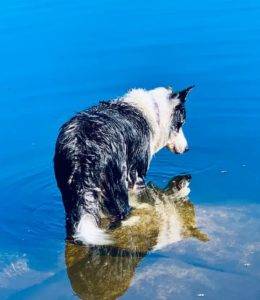
- What would you tell someone considering a Border Collie for the first time?
I would recommend:
- Spend as much time as possible around one in their home environment. (Many people meet Border Collies for the first time at events such as agility trials and fall in love with their intelligence and athleticism without realizing how much work goes into their training and conditioning, and how intense these dogs are – whether or not they are working.)
- Speak to owners about what their dogs’ daily routines are like.
- Be realistic about whether having a life which involves large amounts of dog-focused attention daily for many years is appealing.
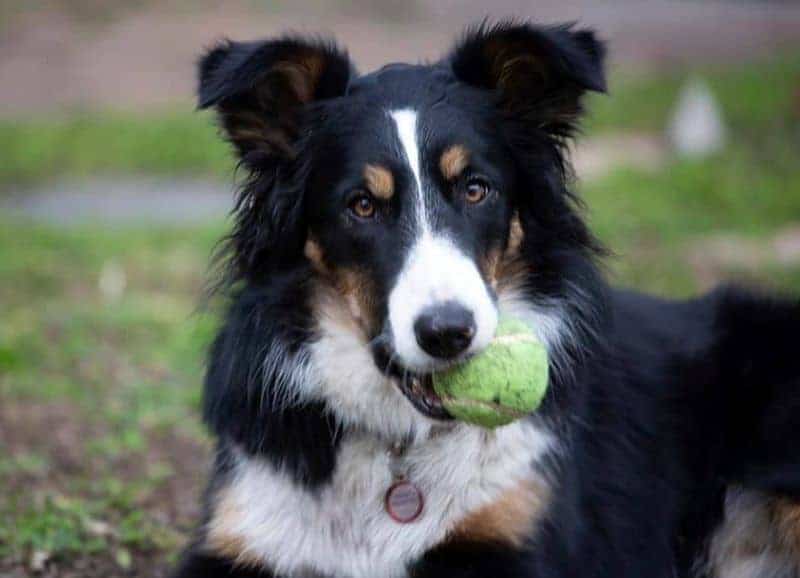
A new owner must respect that these dogs have been bred for centuries to make decisions on their own about what to chase and whether to use force against another living creature. Border Collies are not generally aggressive dogs; but they do have a strong desire to control movement, and that may show itself as a tendency to chase, circle or nip at cars, lawn mowers, joggers, other dogs, and especially young children if they are not given proper supervision. With proper training, most Border Collies can learn that it is appropriate to chase the frisbee – but not the cat or the mailman. However, it is likely that they will try all of those things if left to their own devices!
If you don’t plan on doing something with a Border Collie that is physically and mentally stimulating on a daily basis, a young Border Collie might not be the best match for you. Many Border Collies come into rescue because they started to develop undesirable behaviors as a result of not having proper outlets for their energy and uses for their mind.
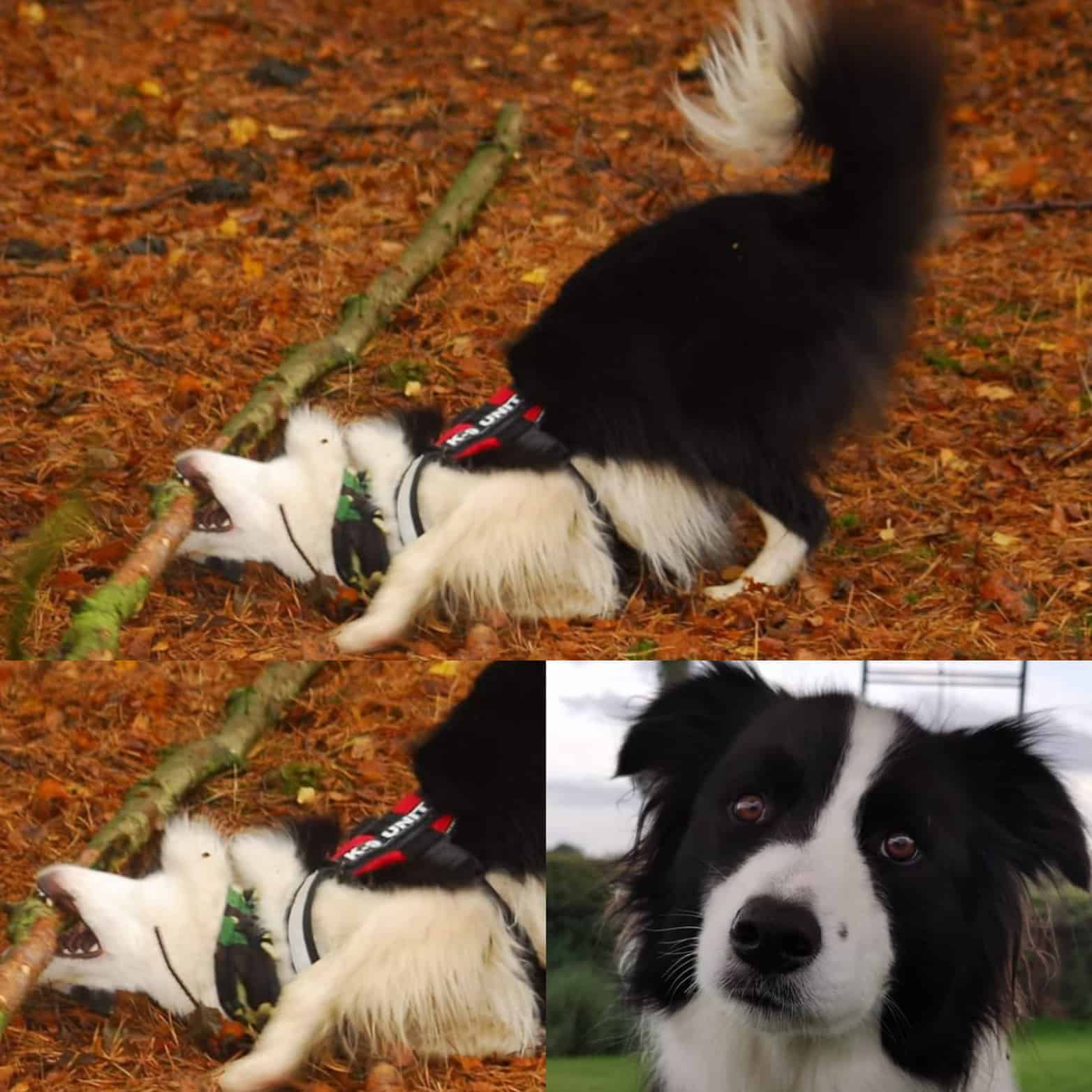
This is a sensitive, “thinking” breed which does not generally do well in chaotic situations. While individuals vary, many Border Collies are sound-sensitive and find it upsetting to live near gun ranges, with young children prone to outbursts of excitement or crying, or where loud vehicles such as motorcycles or snowmobiles are common.
- What would you consider to be an ideal home for a Border Collie?
Young Border Collies are often easiest to manage when they have at least one other young herding dog in the home who will understand and share their herding behaviors. Often they arrange their play such that while one fetches a ball, the other herds the ball-fetcher back to you.
They crave virtually any sort of person-involved work, whether that is something physically demanding like agility or sheep herding, or mentally challenging like obedience, tracking, or trick training. Border Collies are generally physically capable of being good running partners. If the dog has a strong recall, they greatly enjoy off-leash hiking and often swimming.

The Border Collie tends to be a healthy breed with a long life expectancy, and while dogs of 8+ have usually developed a good “off switch” and won’t pester a person for constant activity as a younger dog might, they are generally ready to accompany and participate in activities with their people any time you wish.
An ideal home for a mature Border Collie would be one where the dog’s people are around and able to include them in their comings and goings much of the day; where the dog knows and understands the people who regularly visit the home, especially any children; and often where the dog has respectful canine companionship.

- When you place surrendered dogs, what are you looking for in a new home?
The answer varies greatly by the needs of the particular dog. Unlike many rescue organizations where approved adopters walk around in a shelter-like building and select any dog which appeals to them, Glen Highland considers the interests, skills, and life experiences of each dog and each adopter to see who can make a lifelong “match.”
It is not a criticism of either a dog or an adopter that not all who will be attracted to each other will be a good fit living together in a particular home environment. For instance, many dogs are in rescue because they were stressed and uncomfortable around small children. Such a dog is likely a much happier and safer companion in a home with no one younger than a teen, or in a rural setting rather than a stimulating suburban setting with noisy buses and young children regularly running past.
Some Border Collies rarely leave their person’s side, while others are dedicated escape artists for whom a securely-fenced yard is critical. While many young Border Collies greatly enjoy romping and running with other young dogs, senior Border Collies generally prefer a quieter home where they don’t have to compete for a person’s attention.
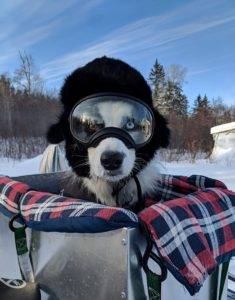
I attended a Scottish Festival where Scottish-origin dog breeds were on display, and had the wonderful opportunity to speak with a group of people affiliated with the Southeast Border Collie Rescue League about the differences and similarities between Border Collies, Rough Collies, and Smooth Collies – which all share origins.
Carl and Vicky Crosby had an accumulated 58 years of dog experience between them, having owned 5 Labrador Retrievers, 3 Border Collies, 2 Rough Collies, and a Lab/Rottweiler/Terrier mix. They said their Border Collies were extremely intelligent, while the Rough Collies were also smart – but more lazy and didn’t need a job as much. To them, Labrador Retrievers and Border Collies have similar energy levels in that they’re “boingy-boingy” even as adults; yet different in that the Labs calmed down somewhat after 2 years but the Border Collies did not.
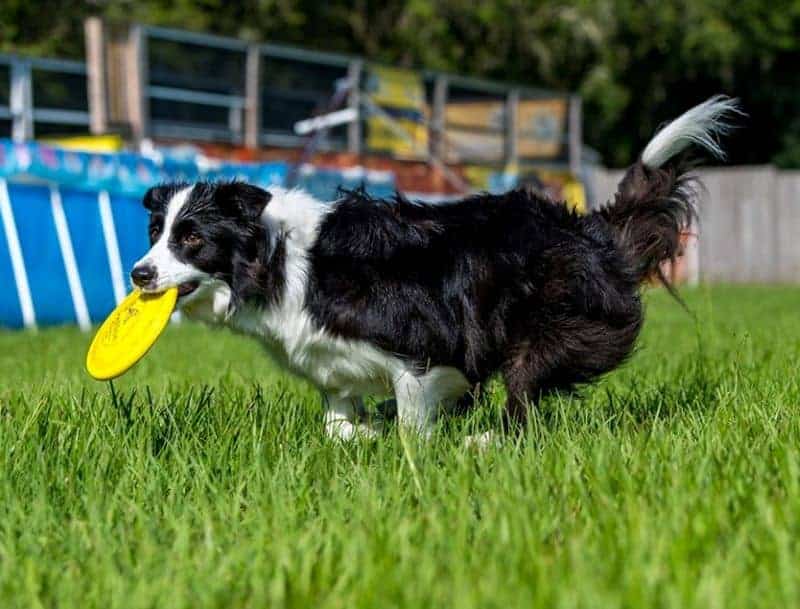
Their Borders loved playing with toys and interacting with humans or other animals. They needed a job or task every day, or even a puzzle box or treat dispensers. Soft, plush toys with squeakers were a waste since they were rapidly destroyed, and a “dead” toy wasn’t fun anymore. One of Carl’s and Vicky’s Border Collies would play with a red laser toy for 15 minutes, then he would get a treat, simulating the natural hunt-feed cycle of wolves in the wild. Similarly, a Border Collie’s herding behavior is a refined version of what wolves do when separating prey from a herd.
(Side note of caution on laser toys: some owners are against using them, since Borders have been known to obsessively “herd” naturally-occurring lights and shadows indoors after playing with laser lights. As Amanda McWilliams, dog mom to 3 Borders, said, “Some dogs may be perfectly fine with them but that one first time could be the start of something awful.” Emily Estes confirmed this: her roommate introduced her BC puppy to a laser pointer light while she was gone, which resulted in her having to hire an animal behaviorist to combat the compulsive shadow-chasing he developed.)
Carl stressed that even though we tend to speak of dog breeds in generalities, there are always variations. Some BC’s are very food-motivated, but a treat can also be love and praise, which helps to improve a bond. They had one Border Collie that didn’t like the Frisbee, because it hurt her soft mouth. Even full siblings can be totally different. Their high-strung adult, Quinn, and Mira’s much calmer puppy, Sybil, were good examples of that.
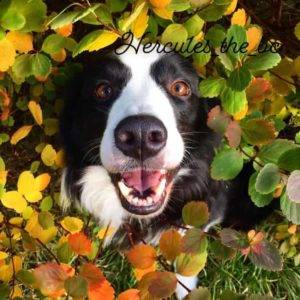
Then it was Mira’s turn to tell stories about her four-month-old Border Collie puppy, Sybil. While Mira was working in a horse barn one day, collecting and rolling up the protective bandages used to wrap the horses’ legs, Sybil sat nearby, watching intently. Then, with absolutely no direction, Sybil independently started collecting the wraps lying scattered around the barn and bringing them to Mira! Richard, a fellow volunteer, pointed out that she was doing what Borders were bred to do – reason things out for themselves.
Another time, Sybil proudly presented an astonished and delighted Mira with a windblown $20 bill. Laughing, Mira said, “She was just holding it in her mouth, staring at me like, ‘Did I do good?’ I praised her a lot and told her, ‘Please do that again!’ All I can think is, she must be aware that money is something I use regularly, therefore – helpful. I swear, she’s so young, and already all she wants in life is to help me out.”
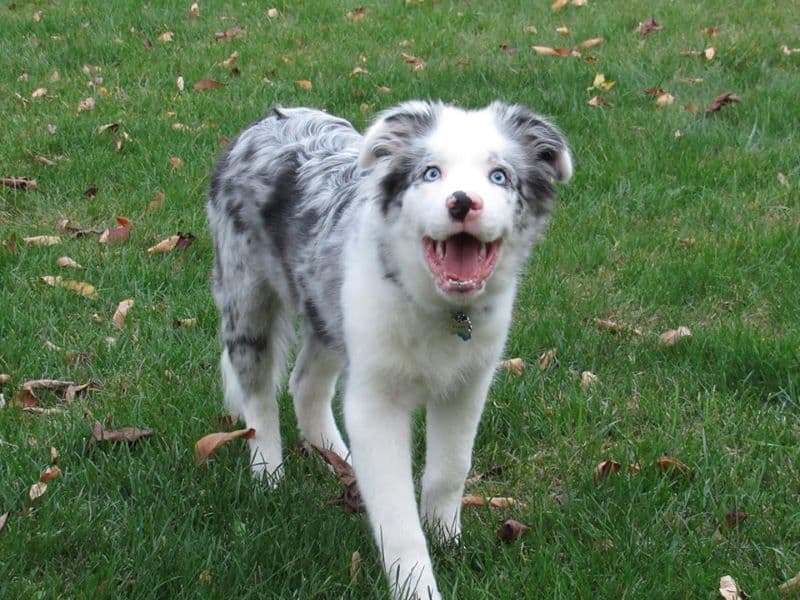
Summary
If you’re considering bringing a Border Collie puppy (or adult) home, remember that breed choice is always less a matter of looks and more a matter of lifestyle. If you are just wild about the look of a Border Collie but know you can’t give one the active life it needs, perhaps look into their more “lazy cousins,” the Rough Collies (or the short-haired versions, Smooth Collies) that over the years have been bred more for companionship than work. Even an Australian Shepherd – in some cases – might make a good alternative for a somewhat lower-energy dog.
If you can dedicate the necessary time and energy to give a pet Border Collie the kind of life it deserves, then by all means, go for it. The Border Collie has so much to offer!
If you enjoyed this post, get free updates by email.
If you have any questions or input about Border Collies or dogs in general, feel free to leave it in the comments below!

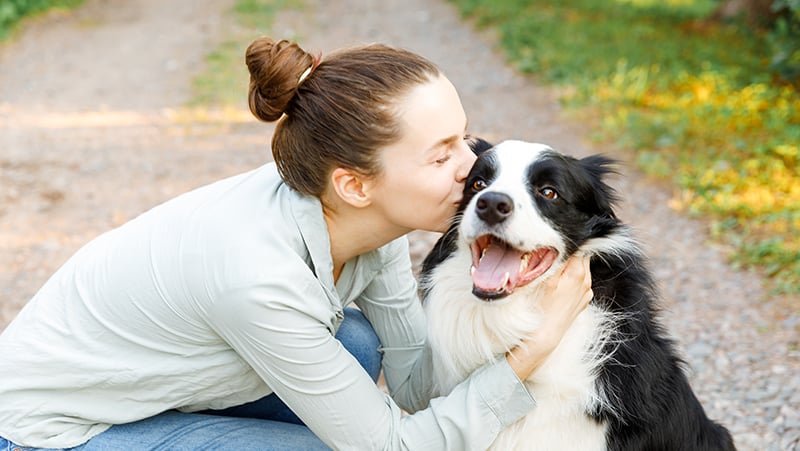



We have a 9 mo old Border–BlueTic Heeler who is the luv of our lives; extremely affectionate, inquisitive & playful. Unfortunately she now has (a bad habit) started to become obnoxiously demanding with her “pawing/scratching” and “very vocal” (with numerous types of sounds!). Any suggestions??
Hi Donna,
Nine months old is an exciting age, but it’s also sort of a “teenager” time for puppies who are becoming older and often start to test and see how much they can get away with! The pawing can be a dominant/assertive behavior, so you’re right to want to curb it. With that, it’s best to redirect her and teach an alternate, less “obnoxiously demanding” behavior, like lie down. If she doesn’t know “lie down” yet, you can start with sit; but lying down is a submissive posture – plus it’s harder for her to paw at you while lying down. If she’s just all over you, you can begin by placing your palm on her head (a dominant/assertive action just like she’s doing to you) and pushing her off or away from you, then giving a sit or lie down command.
You also want to look at the reason for the pawing/whining, which a dog usually does because it wants something. Two of my dogs (my big male Collie and my female Aussie mix) have had issues with impolite pawing, hard enough to leave red marks from their scratches! I can’t tolerate that (especially because I have friends with small children), so instead I’ve taught them that if they want something, they need to ask politely. Also, if they want something from me they need to do something for me – even if it’s just obeying one command.
So, here’s how it looks in my household, for a sort of template. Dog paws at me -> “No, lie down” -> Dog obeys -> “Good dog! What do you want?” -> I literally list all the things they normally want until they respond to one (attention, food, water, treats, play, walk, outside) -> Then they (usually) get the thing they nicely asked for. If there is excessive vocalness, the process is the same, except that I start with “no, quiet” before moving to my “do you want…” and listing all the options. My dogs rarely get anything for free: they have to work for their desires. It gives them structure and a job to do, which most dogs (especially the herding and other working breeds) actually want. Structure is comforting for dogs, who are, after all, pack animals by nature.
For more on barking and curbing very vocal behaviors, see the comments section underneath this article I wrote. I actually addressed this topic twice, both times with similar but slightly differing advice.
I hope this helps, and good luck with your pup! Puppyhood can be a tough time, even when puppies are extremely affectionate like yours, but the good dogs they grow into with work and love are so worth it.
ty very much for getting back. we (hubby & i) appreciate it. yes, she is def testing us. now it’s her “air-biting” — cute but obnoxious at times. and the more we keep learning about her breed types (Border Collie & Heeler) the more we are def convinced she IS a true 50/50 mix of each. again ty for your advise….
No problem! And I get that, especially with Freckles, my Aussie/Pyrenees mix… I tell people I have Rough Collies because they’re comparatively the “lazy cousins” of the herding breeds and I’m a bit lazy myself. ? Freckles has been the most challenging of our dogs in many ways, but she’s also wonderful. I wouldn’t trade her for the world!
I loved this article – really interesting and useful for an assessment piece on dog training I’m doing.
And super interesting because I’ve recently become a foster carer for my local animal shelter – at the moment I have two 5 month old staghound crosses. They and our 18 month old kelpie (who thankfully my husband runs every day) are getting along famously.
I must admit I don’t have the energy for border collies although I do admire the breed.
What a great article!! I have 3 younger border collies involved in high level dog sports (agility, herding, barn hunt plus confirmation) and a12 year old BC who we got when her previous owner retired her from world-level agility. They are a handful but we keep them very busy. It greatly helps that we are retired. Your article is one of the most accurate, well-rounded presentations I have encountered of what it takes to properly nurture a border collie. Kudos!
I have 3 border collies and thru my life have had border collies. I do have a small farm, so they stay active. Despite that they always want to go. A couple of my dogs surf. I love their intelligence, and they are very affectionate. They know to watch the grandkids when they come over. They also have a good grasp of the English language, so you have to watch what you say. I wouldn’t have any other kind of dog. Hands down the best! Blows my mind their intelligence. But, they are not dogs that should just be in a back yard. It is not fair to the dog.